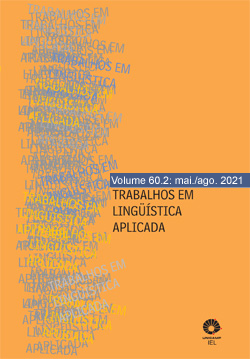Abstract
Living in the Triple border Argentina-Brazil-Paraguay region, Argentine city Puerto Iguazú's Indigenous communities have undergone social and territorial changes due to policies that have resulted in the construction of the Iryapú Jungle tourist area, exploited by national and international hotel networks. This paper aims to discuss the language uses in tourism promotion within this area, where Guarani language and culture elements are mobilized to produce authenticity and generate symbolic added value (HELLER; DUCHÊNE, 2012, 2016). To elaborate this exploratory case study, bibliographic research on the Guaranis and tourism in the Triple border was initially carried out; subsequently, regional tourism promotion texts were selected and analyzed. The analysis points out that both luxury hotels and Indigenous communities mobilize Guarani language and culture resources to generate added value to tourism products and services. In the Guarani's case, these uses express both adherence to the profit framework and resistance strategies, using these discourses in favor of their language and culture preservation. Although several studies in the area point to language commodification as a possible promoter of the subjects' agency and the income generation to minority groups, we argue that the Guaranis, inserted in a capitalist exploitation and alienation relation with the Iryapú Jungle enterprise, are in a position between necessity and resistance.
References
APPADURAI, A. (1986). A vida social das coisas: as mercadorias sob uma perspectiva cultural. Niterói: EDUFF, 2008.
CANTORE, A.; BOFFELLI, C. (2017). Etnicidad mbyá en Puerto Iguazú: Explotación turística de/en comunidades indígenas en la triple frontera (Misiones, Argentina). Runa, v. 38, n. 2, p. 53-69.
DIECKOW, L. (2012). El uso de las fallas del mercado en los productos turísticos de destinos emergentes. Estudio de caso: destino Iguazú Cataratas (Argentina-Brasil). Palermo Business Review, v. 6, p. 163-176.
ENRIZ, N. (2011). Políticas públicas para familias indígenas en Misiones. Runa, n. 32, v. 1, p. 27-42.
ENRIZ, N. (2018). Turismo internacional de gran escala e identidad étnica en la Triple Frontera misionera. Etnografías, DOSSIER 20 años del Idaes - Investigación y docencia en Ciencias Sociales para una sociedad más justa, a. 4, p. 81-88.
GIL, A. C. (2008). Métodos e técnicas de pesquisa social. São Paulo: Atlas.
GONZÁLES, R.; RAMPELLO, P.; DOMÍNGUEZ, I. (2017). Impactos socio-territoriales: Puerto Iguazú y Reserva Iriapú, 600 hectáreas. Misiones, Argentina. Revista El periplo sustentable, n. 3, p. 363-393.
HARVEY, D. (2016). 17 contradições e o fim do capitalismo. São Paulo: Boitempo.
HARVEY, D. (2018). Alienation. Triple C, n. 16, v. 2, p. 424-439.
HELLER, M. (2005). Language, skill and authenticity in the globalized new economy. Noves SL. Revista de Sociolinguística, n. 2, p. 1-7.
HELLER, M. (2010). The Commodification of Language. The Annual Review of Anthropology, v. 39, p. 101-114.
HELLER, M.; DUCHÊNE, A. (2012). Pride and profit: Changing discourses of language, capital and nation-state. In: Duchêne, A.; Heller, M. (orgs.), Language in late capitalism: Pride and profit. New York: Routledge, p. 1-21.
HELLER, M.; DUCHÊNE, A. (2016). Treating language as an economic resource: Discourse, data and debate. In: Coupland, N. (org.), Sociolinguistics: Theoretical debates. Cambridge: Cambridge Press, p. 139-156.
HELLER, M.; JAWORSKI, A.; THURLOW, C. (2014). Introduction: Sociolinguistics and tourism – mobilities, markets, multilingualism. Journal of Sociolinguistics, n. 18, v. 4, p. 425-458.
HELLER, M.; McELHINNY, B. (2017). Language, capitalism, colonialism: toward a critical history. Toronto: University of Toronto Press.
HELLER, M.; PUJOLAR, J.; DUCHÊNE, A. (2014). Linguistic commodification in tourism. Journal of Sociolinguistics, n. 18, v. 4, p. 539–566.
HERNÁNDEZ, F. M. (2017). “El mundo es ancho y turístico”. Apuntes teórico-metodológicos para una geografía del turismo en la actualidad. Espacio y Desarrollo, n. 29, p. 57-90.
JAFFE, A. (2019). Poeticizing the economy: The corsican language in a nexus of pride and profit. Multilingua, n. 38, v. 1, p. 9-27.
KELLY-HOLMES, H.; PIETIKÄINEN, S. (2014). Commodifying Sámi culture in an indigenous tourism site. Journal of Sociolinguistics, n. 18, v. 4, p. 518-538.
MASON, J. (2002). Qualitative researching. Londres: Sage Publications.
MELIÀ, B. (1989). La tierra-sin-mal de los Guaraníes: Economía y profecía. América Indígena, n. 3, v. XLIX, p. 491-507.
MELIÀ, B. (2008). (Org.) Guarani Retã 2008. Povos Guarani na fronteira Argentina, Brasil e Paraguai. Realização: UNaM, ENDEPA; CTI, CIMI, ISA, UFGD; CEPAG, CONAPI, SAI, GAT, SPSAJ, CAPI.
MELIÀ, B. (2016). (Org.) Mapa Guaraní Continental 2016. Povos Guarani na Argentina, Bolívia, Brasil e Paraguai. Argentina: ENDEPA e UNSA; Bolivia: APG, CIPCA, CERDET y ILC; Brasil: ATY GUASU, YVY RUPA, CIMI, CTI, ISA, FAIND, UNILA y FUNAI; Paraguai: CONAPI; Continental: CCNAGUA.
PIETIKÄINEN, S; KELLY-HOLMES, H. (2011). The local political economy of languages in a Sámi tourism destination: Authenticity and mobility in the labelling of souvenirs. Journal of Sociolinguistics, n. 15, v. 3, p. 323-346.
PIETIKÄINEN, S.; KELLY-HOLMES, H.; JAFFE, A.; COUPLAND, N. (2016). Sociolinguistics from the periphery: small languages in new circumstances. Cambridge: University Press.
SOUZA, A. L. (2011). Letramentos de reexistência – poesia, grafite, música, dança: hip-hop. São Paulo: Parábola Editorial.
SOUZA, A. L.; JOVINO, I. S.; MUNIZ, K. S. (2018). Letramento de reexistência – Um conceito em movimentos negros. Revista da ABPN, v. 10, p. 01-11.
THURLOW, C.; JAWORSKI, A. (2012). Elite mobilities: The semiotic landscapes of luxury and privilege. Social Semiotics, n. 4, v. 22, p. 487-516.
WILDE, G. (2007). De la depredación a la conservación. Génesis y evolución del discurso hegemónico sobre la selva misionera y sus habitantes. Ambiente & Sociedade, n. 1, v. X, p. 87-106.

This work is licensed under a Creative Commons Attribution 4.0 International License.
Copyright (c) 2021 Trabalhos em Linguística Aplicada


